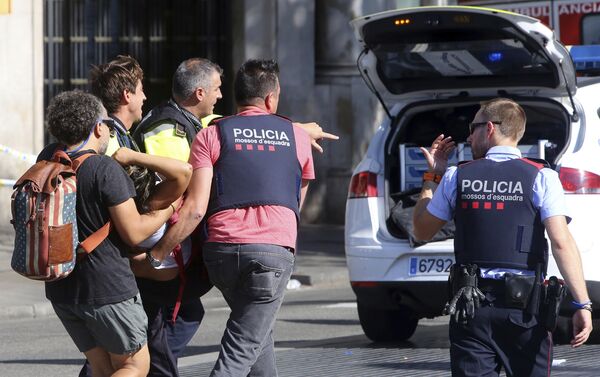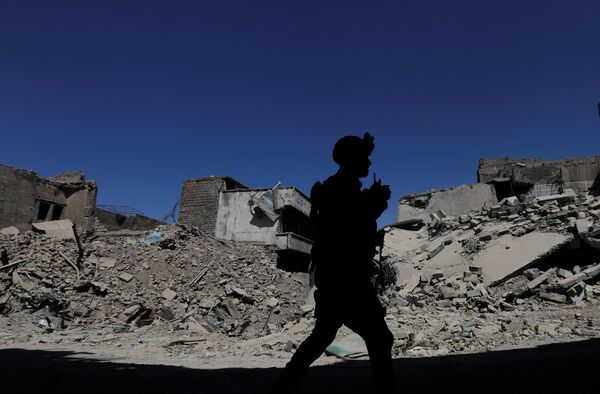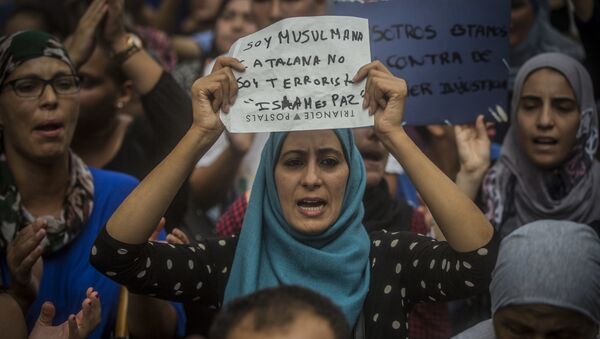Since the events in Barcelona, Cambrils and Alcanar last week details have emerged suggesting Abdel-Baki es-Sati, an imam at a mosque in the Catalan town of Ripoll, was the mastermind behind the Daesh-supporting cell.
Es-Sati, a Moroccan who is thought to have died in an explosion at a bomb factory a few days before the August 17 van attack in Barcelona, is reported to have been radicalized himself after meeting the 2004 Madrid bombers in jail.
'Spiritual Leaders'
The mosque the imam preached at are blaming the Catalan police for not alerting them if Es Satty's criminal convictions.
— David Videcette (@DavidVidecette) 21 August 2017
The violence emanating from the Ripoll cell — most of whose members came from the Maghreb — has reignited the debate about whether individual imams are to blame for the radicalization of Islamist terrorists or if social media and other online sources are the main cause.
David Videcette, a former counterterrorist officer with the Metropolitan Police in London, and author, said es-Sati appeared to have been not just a spiritual leader but the mastermind and possibly even the bomb maker.
"In my experience there is always someone who is a 'pir' or spiritual leader, who keeps them on track and says what they are doing is supported by God," Mr. Videcette told Sputnik.
"When we look at terrorism in the UK, we know it is not evenly spread geographically. We know there are certain areas and certain mosques which appear to breed terrorists at a much faster rate than anywhere else," Mr. Videcette added.

"There are certain mosques in this country [UK] and in other countries which breed jihadis and terrorists at a much greater rate than others, and there are imams and mosques which are much more involved in these activities than others," Mr. Videcette told Sputnik.
Roshan Salih, editor of 5 Pillars, a British Muslim website, totally disagreed.
"You don't get this radicalizing rhetoric in mosques or madrassas. I can't think of one imam in a public institution who would preach this senseless so-called jihad, and it's not how people get radicalized. People don't get radicalized in mosques. They get radicalized in the shadows, they get radicalized by the Internet, they get radicalized by what they see on television with quite frankly Western nations invading Muslim nations and bombing them and it's been a long process since the 'war on terror' started. There were no attacks on the West before the invasion of Iraq," Mr. Salih told Sputnik.
After every attack, be it Westminster, Manchester, Borough Market, or further afield, there are calls from politicians and the media for the Muslim community to do more to identify the zealots before they attack.
But Mr. Salih said this reflected a widespread ignorance about the terrorists.
'We're not hiding them under our beds'
"Governments across Europe are effectively saying to the Muslim community 'sort out your own house, because these people are springing from your communities'. Now I reject that. These people are not springing from our communities. We are not hiding them under our beds. We literally do not know these people. We're not harboring them. They are the product of very complex factors, a lot of them are criminals, and there is nothing the mainstream Muslim community can do to eradicate this problem," Mr. Salih added.
He said most mosque imams in Britain were apolitical but he said they do make clear that Daesh is a "warped view of Islam."
Mr. Salih said the radicalization of some disillusioned Muslims had to be seen in the context of events in the Middle East and Afghanistan, and it was Western foreign policy in the region which was partly to blame.

Mr. Salih said there have been a handful of radical imams, such as Abu Hamza, who he described as a "preacher of hate," and Anjem Choudhury, in Britain.
He said they were "rejects" from the Muslim community and less than 0.1 percent of British Muslims bought into Daesh's ideology.
Following a Pattern
Aqui el grupo de los terroristas de Barcelona, son todos muy jóvenes pero fueron bien organizados. pic.twitter.com/bf5eUcYTBw
— Loretta Napoleoni (@l_napoleoni) 20 August 2017
[Tweet: "Here are the group of terrorists in Barcelona, are all very young but they were well organized."]
Loretta Napoleoni, an expert on the financing of terrorism and author of Merchants of Men, said that in the 1980s some mosques would encourage young Muslims to go to Afghanistan and fight the "oppressor" — the Soviet Union.
A few foreigners stayed on to join al-Qaeda, under Osama Bin Laden, but Islamist terrorism really took off after the US-led invasion of Iraq in 2003, she said.
"Then in 2010 we get Islamic State [Daesh], who regrouped and moved to Syria, and radicalization, through the Internet, encouraged people to go there," Ms. Napoleoni told Sputnik.
She said that in 2014 Daesh was telling people to come to Syria and fight with them, but more recently they have been encouraging sympathizers to stay in their own countries and conduct attacks there.
On August 17 a van, driven by Younes Abouyaaqoub, hit pedestrians in the center of Barcelona, killing 13 and injuring over 130 others.
Hours after the Barcelona incident, another vehicle attack took place in Catalonia's southern town of Cambrils. In the attack, a police officer and six civilians were injured and at least one of them died later.
The responsibility for the van attack in Barcelona was reportedly claimed by the Daesh terror group.
Abouyaaqoub was shot dead in the suburb of Subirats on Monday, August 21.
Ms. Napoleoni said terror attacks like those in Barcelona followed a pattern but were not meant to achieve anything per se.
"The attack is an ad for the movement, in a similar way to how the anarchists operated in the 19th century," she told Sputnik.
Most high-profile extremist imams have been dealt with by the authorities — such as Abu Hamza, who was extradited to the US and jailed for life in 2015 for supporting terrorism — but Ms. Napoleoni said it was "highly unlikely" any imams in any of the visible mosques in European cities were in favor of Daesh.
She said es-Sati was clearly hiding his activities from worshippers at the mosque in Ripoll.
"Everybody says he was very quiet and shy. There is something here which doesn't make sense to me. I'm pretty sure there were people in the community that thought that," said Ms. Napoleoni.
"We should reach out to the Muslim community and embrace them, instead of what we are doing now which is pushing them away," Ms. Napoleoni concluded.
Roshan Salih agreed with her and claimed the British government was only interested in the views of certain "poster boys" who shared their worldview.
"Mainstream members of the Muslim community who are critical of government policy are not engaged with. They are only talking to people who will serve as an echo chamber for what they want to say. Those people, like Maajid Nawaz [founder of the counter-terrorism think-tank Quilliam] and Sara Khan [CEO of the NGO, Inspire], have no grassroots support in the community and they are not embedded within the community itself," said Mr. Salih.





